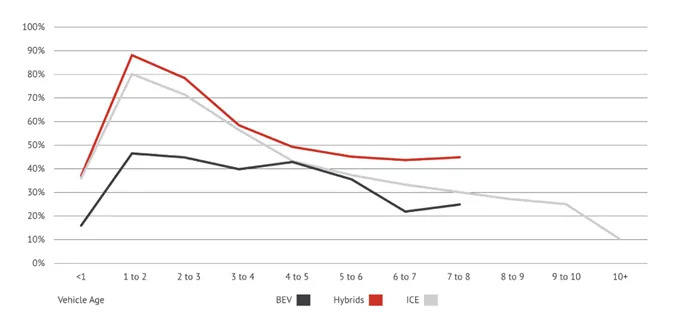-
解决方案
MANUFACTURER
NETWORKPERFORMANCE主动网络管理可以更有效地将当今的消费者与汽车连接起来。
SALESPERFORMANCE发现真正影响日常绩效以增加市场份额的因素。
AFTERSALESPERFORMANCE让顾客回头以提高服务保留率并建立长期忠诚度。
营销PERFORMANCE科学的精准度让每一分营销费用都发挥更大的作用。
- RESOURCES
- 新闻
- 关于我们
- 职业
- 活动
12 月 112024 年
Why Service Matters More Than Ever: Dealership Service in an EV-Focused Future

本文是今年 Urban Science/Harris Poll 调查系列分析的开篇之作。该调查深入探讨了消费者对传统汽车经销商模式相关性的看法。
As the U.S. automotive world moves toward various electrification choices, dealership service departments are becoming more critical to sales and dealership loyalty. Sales and service have always been connected, but electric vehicles (EVs) technology has bonded them more closely than ever before.
Recent data from Urban Science finds that 56% of surveyed auto buyers strongly agree that dealerships’ service department play a significant role in choosing where to purchase vehicles. That is up 6% from the past year.
In addition, 61% of EV owners strongly agree they prefer to service their vehicle at the dealership where it was purchased. That’s not surprising for many reasons, including the sophisticated technology of EVs.
Urban Science research shows service retention for ICE vehicles within franchised dealerships drops after 3- to 4-years. That’s when many warranties expire and trade-ins begin.
How EVs Build Dealership Loyalty
Dealers can expect service loyalty retention to extend beyond that time for electric vehicles. Consider that hybrids require oil change, engine air filter replacement and other routine maintenance commonly associated with ICE vehicles. But hybrids, and indeed all EVs, also need service on battery/EV-components that are unique to their powertrains.

The survey findings from the recent Urban Science report show that hybrid owners value franchise dealerships’ service departments over independent or general repair shops.
Respondents noted they especially value the following from franchise dealerships’ shops:

The Growing Importance of Service for Future Purchases
In the past, service visits were viewed largely as transactional. Customers came in for oil changes or tire rotations, had the work completed, and left. However, with the introduction of more sophisticated vehicle technology — especially in hybrids and EVs — service interactions have evolved into crucial touchpoints that influence customers’ future purchase decisions. In addition, dealers can further educate service customers about hybrids and EVs including features, maintenance and more. Dealerships emphasizing quality service and personalized care have a higher chance of keeping customers engaged and building long-term loyalty.
Service interactions are also unique in offering a dealership multiple opportunities to impress customers and showcase its value. Studies show that consumers who feel satisfied with their service experience are likelier to return when it’s time for their next vehicle purchase. For dealers, every service visit is a chance to foster loyalty, build trust, and remind customers that there are an array of services they may want to adopt. Such personal discussions keep the customer returning to the dealership for service and future purchases. As Urban Science has reported, owners gain trust through enhanced control and confidence in their vehicles, while dealerships and manufacturers grow and maintain strong customer relationships.
Working the Service Lane
Service lanes are gaining importance as tools to help convert ICE owners to hybrid or EV owners. Consider that Urban Science research shows that auto buyers are now experiencing some of the key interactions that can bridge that gap:

Another service drive opportunity — 82% of auto buyers reported that a $35 incentive would motivate them to test drive an EV and 81% said that it would motivate them to bring their vehicle in for maintenance.
Building an EV-Centric Strategy
As the industry moves toward a more electrified future, dealerships that meld sales and service offerings are more likely to succeed. Consumers, especially EV owners, consider service a prime reason for choosing and remaining loyal to dealerships. Franchise service departments can grow their market shares and retention levels by responding to consumers’ preferences.
*This survey was conducted online by The Harris Poll on behalf of Urban Science among 3,005 US adults aged 18+ who currently own or lease or plan to purchase or lease a new or used vehicle in the next 12 months (referred to in this report as “auto-buyers” or “auto-buying public”), and 250 U.S. OEM automotive dealers, whose titles were Sales Manager, General Manager, or Principal/VP/Owner.
The auto-buying public survey was conducted from January 4 to February 13, 2024. Data are weighted where necessary by demographics to bring them in line with their actual proportions in the population. The dealer survey was conducted January 5 to February 7, 2024. Results were not weighted and are only representative of those who completed the survey.
The sampling precision of Harris online polls is measured by using a Bayesian credible interval. For this study, the sample data is accurate to within ±2.3 percentage points for US auto-buyers and ±6.2 for U.S. OEM automotive dealer using a 95% confidence level.
For complete survey methodology, including weighting variables and subgroup sample sizes, please contact Amy Bowering (arbowering@urbanscience.com).
最新见解
4 月 10th, 2025
Q1 EV Retail Sales Report
This Q1 electric vehicle* (EV) retail sales report features Urban Science’s proprietary 2025 sales insights through March 31st, 2025…
4 月 2nd, 2025
Urban Science launches new online business planning tool to enhance automaker-dealer alignment and efficiency
New offering creates high-level business plans in minutes, empowers OEMs and dealers to more responsively plan against – and for – transformational market dynamics Urban Science today announced the […]
3 月 3rd, 2025
Urban Scientists raise $4,600 for LA wildfire relief through company gift-matching campaign
We’re pleased to announce our recent gift-matching campaign raised $4,600 to support wildfire relief efforts in the greater Los Angeles area. Thanks to the generous support of Urban Science employees […]

